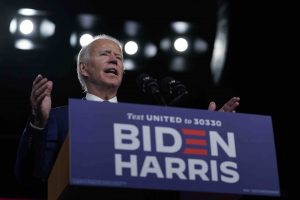Newly inaugurated President of the United States Joe Biden hit the ground running Wednesday (Thursday morning, Australia time) in instituting his administration’s climate and environmental policies, not only re-signing to the Paris climate change agreement and rescinding approvals for the controversial Keystone XL oil pipeline but initiating the process to roll back Trump-era “environmental” policy by addressing the “social cost of carbon”.
As RenewEconomy has already reported, US President Joe Biden signed a raft of executive orders almost immediately after his inauguration, including bringing the United States back into the Paris Agreement and rescinding previous approvals for the Keystone XL oil pipeline that was supposed to stretch from Canada to the Gulf Coast.
These initial executive orders signal Biden’s commitment to follow through on the promises he made during the latter part of his presidential campaign, which were given further weight with promised government appointments for former Environmental Protection Agency head Gina McCarthy as a key domestic climate advisor while former Secretary of State John Kerry was nominated to Special Presidential Envoy for Climate.
Former Democratic rival for the presidential nomination Pete Buttigieg was also nominated to the post of Transportation Secretary, which will carry significant environmental responsibilities in the Biden administration.
In the hours after Biden’s signing of executive orders, his administration’s press team began slowly uploading announcements to the White House website.
Reports of the executive orders signed by Biden included one serving to initiate the process to reverse environmental and climate policies made during the previous Trump administration – many of which were reversals themselves of Obama-era environmental and climate policies.
In an executive order entitled “Protecting Public Health and the Environment and Restoring Science to Tackle the Climate Crisis”, Biden promised to “advance environmental justice” where “the Federal Government has failed to meet that commitment in the past”.
To do this – and in stark contrast to the Trump administration (not to mention governments around the world such as Australia – Biden’s executive order promised that “the Federal Government must be guided by the best science” and announced that it will now be “the policy of my Administration to listen to the science” – serving as a distressing reminder that there are those that consider it sensible to actively reject science, such as Australia’s Liberal Party and its leaders.
Part of Biden’s executive order to roll back Trump-era policies and implement science-directed changes is a welcome acknowledgement of the “social cost of carbon” (as well as the social cost of nitrous oxide and methane) – “estimates of the monetized damages associated with incremental increases in greenhouse gas emissions.”
The Biden administration has therefore instructed its agencies to “capture the full costs of greenhouse gas emissions as accurately as possible, including by taking global damages into account” in their policy making so as to recognise “the breadth of climate impacts, and [support] the international leadership of the United States on climate issues.”
The executive order also revealed the formation of a Working Group to include a number of cabinet-level appointees including Secretaries of the Treasury, Interior, Commerce, Transportation, Energy, as well as Chairs and Assistants to the President on other environmental and economic issues.
Further, and doubling down on the Biden administration’s promise to “listen to the science”, the executive order instructed that “the Working Group shall consider the recommendations of the National Academies of Science, Engineering, and Medicine as reported in Valuing Climate Damages: Updating Estimation of the Social Cost of Carbon Dioxide (2017) and other pertinent scientific literature; solicit public comment; engage with the public and stakeholders; seek the advice of ethics experts; and ensure that the SCC, SCN, and SCM reflect the interests of future generations in avoiding threats posed by climate change.”
Importantly, though less sexy in nature, Biden’s executive order initiated an immediate review of actions taken by all agencies between January 20, 2017, and January 20, 2021 – i.e., during the Trump administration.
The review is intended to recognise any agency actions taken during the Trump era “that are or may be inconsistent with, or present obstacles to” the country’s re-established commitment to science and the environment.
As such, agencies will work over the next 30 days to offer up “for notice and comment a proposed rule suspending, revising, or rescinding the agency action within the time frame specified.”
Specifically, the Biden administration is looking at Trump-era changes to rulings on methane emissions, fuel economy and efficiency standards, air pollution, and other environmental regulations the Trump administration introduced that served to relax regulation on environmentally harmful practices.
The 3,300-word long executive order – one of the longer ones signed by Biden on Wednesday afternoon – includes a raft of other revisions and revocations, including halting oil and gas exploration and development in the Arctic National Wildlife Refuge (ANWR), restoring national monuments, and reinstituting environmental guardrails done away with in the Trump administration.
Unsurprisingly, Biden’s actions following through on his promises and commitments made through the latter part of his presidential run have been praised by industry and environmental groups.
“The sweeping nature of these executive orders are an important down payment in addressing the tatters left behind by President Trump,” said Dr. Kathleen Rest, executive director at the Union of Concerned Scientists (UCS).
“They seek to reverse policies that fly in the face of science, harm public health and degrade the environment. There are so many elements to highlight, including rejoining the world community in the Paris Climate Accord.
“I’m particularly pleased that the administration will consider revising vehicle fuel economy and emissions standards and will ensure that federal agencies, when issuing regulations, account for the full costs of global warming pollution, including climate risks and environmental justice.
I’m also heartened that federal agencies will consider revising methane emissions standards, as well as appliance and building efficiency standards.
“Undoing the damage that the previous administration has inflicted on this country is a massive job, but these wide-ranging executive actions show the Biden administration is up to the challenge.
With these day one measures, President Biden is delivering on his promise, demonstrating that climate change will be at the top of his administration’s agenda. And his skilled climate team knows what it takes to make progress.”
“By re-joining the Paris Agreement, President Biden delivers a message on Day One of his administration that climate change stands at the top of his priorities,” said Carter Roberts, President and CEO of the World Wildlife Fund (WWF) in the US.
“This action joins other immediate steps the Biden-Harris administration will take to reverse his predecessor’s efforts to weaken our country’s environmental laws and institutions.
And it returns our country to a leadership position in protecting the air, the water, and the ecosystems that sustain our way of life.
“We’re committed to working with the Biden-Harris administration to establish 2030 and 2050 climate targets aligned with science and to mobilize our society to deliver on them.
By building an economic recovery that is both green and inclusive, the US can meet its biggest obligations at home and set the stage to work with other countries to set the kind of aggressive global ambitions we all need










